Unveiling the invisible struggle: The battle against homelessness
Isabella County Restoration House efforts in community
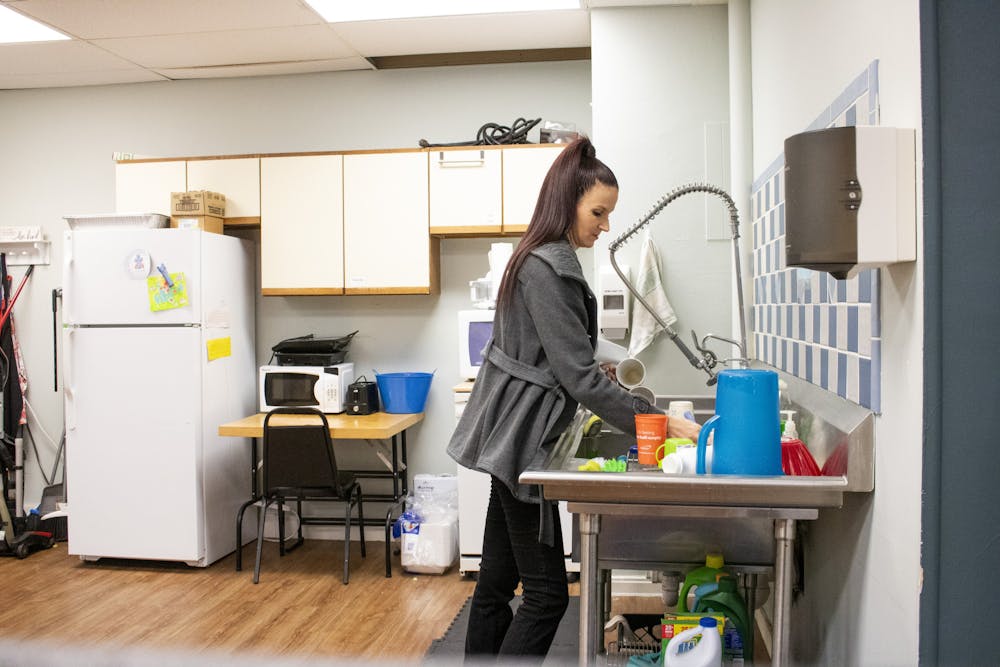
Isabella County Restoration House staff member Stephanie Creel cleans coffee mugs before the site opens, Wednesday, Dec. 6, in downtown Mount Pleasant. (CM-Life | Jenna Spanola)
In the midst of Isabella County’s socioeconomic landscape, a stark reality surfaces – over a quarter of the population grapples with poverty. This issue oftentimes makes it difficult for those in the community to afford housing costs.
However, for the past 11 years, one organization has led the battle against homelessness in the community, prevailing as a beacon of security and hope and striving to make a difference in the lives of those in need.
The Isabella County Restoration House (ICRH) is a rotating homeless shelter located in downtown Mount Pleasant that helps to provide temporary shelter to those experiencing homelessness in the community. The organization also works closely alongside its community to provide its guests with food at the Isabella Community Soup Kitchen and host sites.
Aside from providing shelter and meals, the ICRH also helps to address the specific needs of its guests, such as helping them with transportation to appointments, getting them access to a primary care physician or providing education on budgeting.
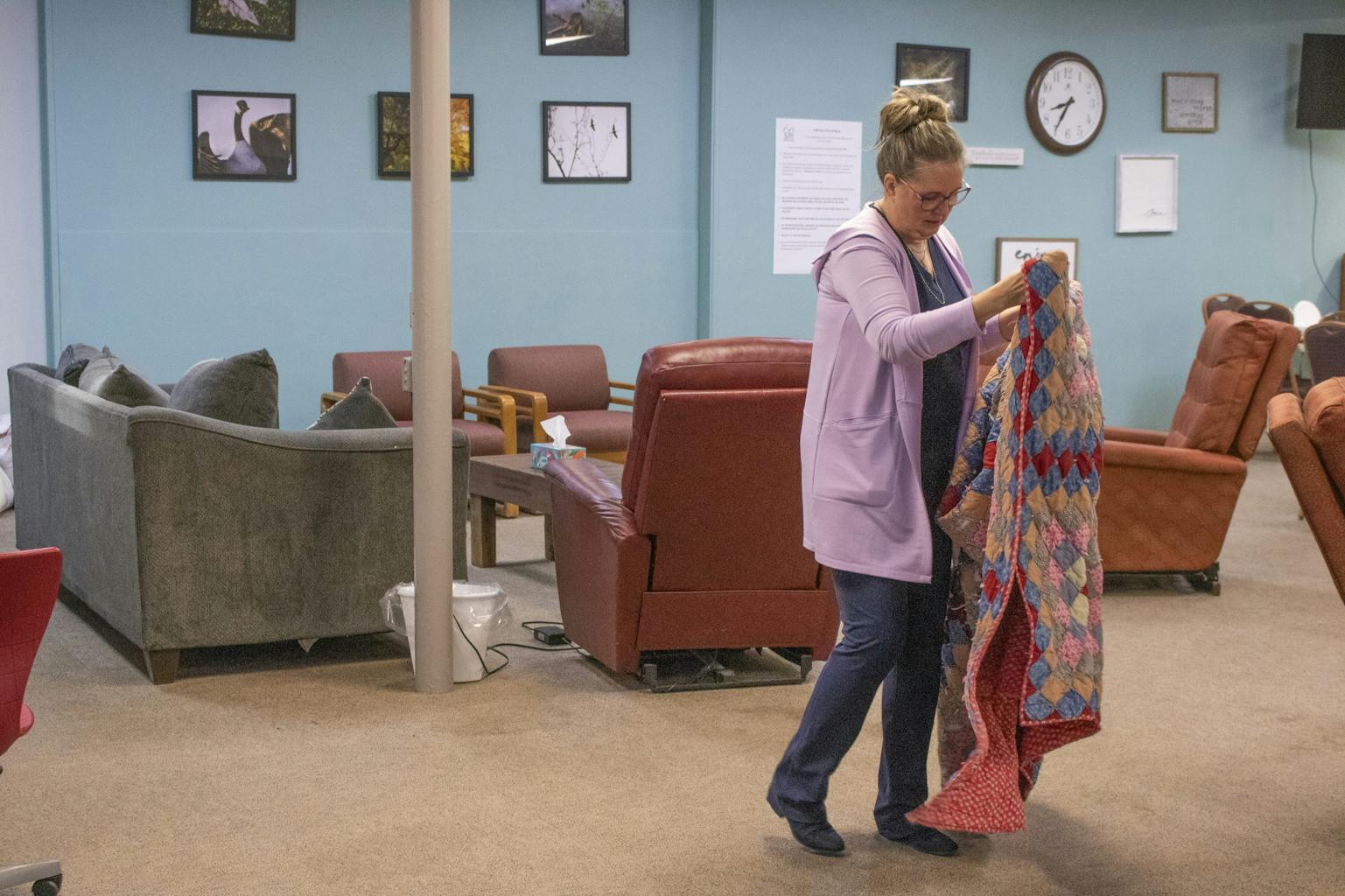
Executive Director of the Isabella Count Restoration House Dee Obrecht folds clean blankets Wednesday, Dec. 6, in downtown Mount Pleasant.
Dee Obrecht, the executive director of the ICRH, said that many guests who first arrive are in “survival mode,” so the organization’s first goal is to make them feel at ease.
“When you’re homeless, it’s a traumatizing experience,” she said. “They’re susceptible to not just the elements, as far as cold and heat and that type of thing, but they’re also susceptible to safety and security issues. And so we try to make sure that they can feel safe and secure.”
According to the National Library of Medicine, “Stable housing and service programs create a sense of safety, security and stability for homeless individuals, who often face hardships in securing a safe place to sleep.”
Once the ICRH can get guests to a place where they feel comfortable, she said the organization then helps to provide an environment that supports moving forward by connecting clients with the resources they need to do so.
According to the ICRH’s website, there are roughly 510 homeless individuals in Mount Pleasant at any given time, 135 of which are school children without a fixed address.
However, Obrecht said it is oftentimes difficult to determine the extent of homelessness.
“It’s hard to count homelessness,” she said. “Especially in our community, they go to the wooded areas, the state land around here, and they tend to camp out and hide. They know they have to clear up everything when they leave for the day, so (their belongings) don’t get found and destroyed or thrown out or stolen.”
The ICRH began its first rotational season in 2012-2013.
As a rotating shelter, the ICRH collaborates with different churches as host sites. Every week throughout the restoration house’s 24-week operating period, a different host church will provide shelter, meals and support to individuals and families experiencing homelessness.
The idea for the ICRH was born out of a collective concern within the community about the lack of services for people experiencing homelessness in Isabella County. A group, including many Central Michigan University professors and local business leaders, came together to address the community’s concern.
A research committee was put together to study which homeless shelter model would be the most effective for the community.
After nearly a year of researching the committee finally settled on the rotational method.
“It’s probably the easiest, quickest and cheapest to get started,” Obrecht said. “You don’t have to buy a facility. You don’t have to rent a facility. And you know, you can easily get this going with the help of some churches.”
NEW YEAR'S RESOLUTION: "To just see us move forward. To make the Isabella County Restoration House more stable and more permanent and providing the best services that we can."
-- Dee Obrecht, ICRH executive director
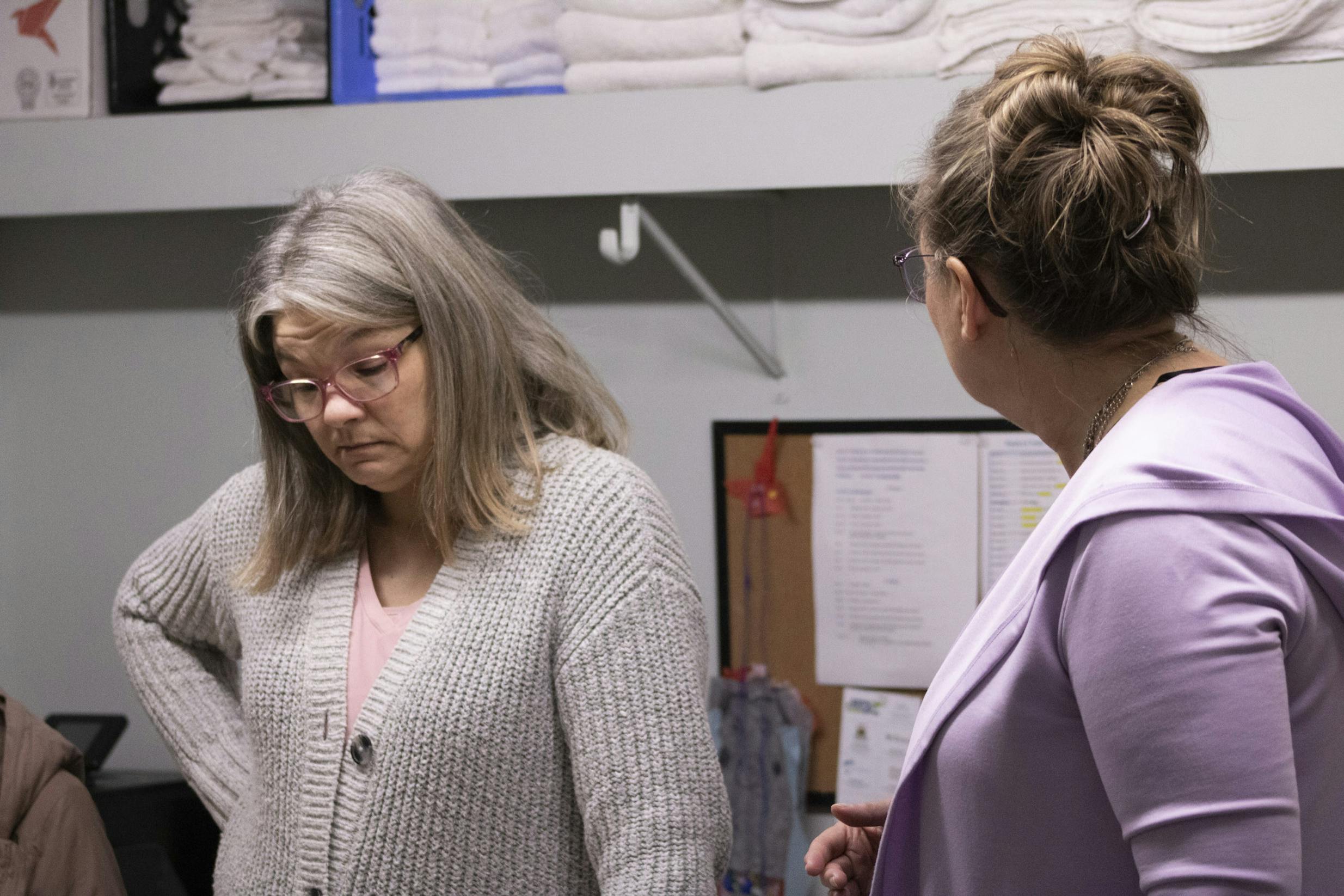
Isabella County staff member Kendra Milton (left) and Executive Director Dee Obrecht discuss work-related questions, Wednesday, Dec. 6, in downtown Mount Pleasant. (CM-Life | Jenna Spanola)
Navigating change
While the method persists, numerous changes have occurred. Initially, the shelter ran for three months, from January to March. Those seeking shelter would arrive at a check-in location, then be transported to a host church where they would eat their evening meal and stay the night. Then, in the morning, they would be transported to the community soup kitchen where they would eat breakfast and oftentimes stay until lunch.
However, this left them with additional time between when the soup kitchen closed and the check-in time began, so many were left with nothing to do for a few hours every afternoon.
In 2017, the restoration house opened a day shelter where guests could stay all day until they were dropped off at the church host to stay the night, providing a 24/7 haven for guests.
The day shelter has expanded its services to also include laundry services and showers.
The shelter now also operates from November through mid-April and has the ability to serve 30 guests each day, compared to the nine guests each night during its earliest years.
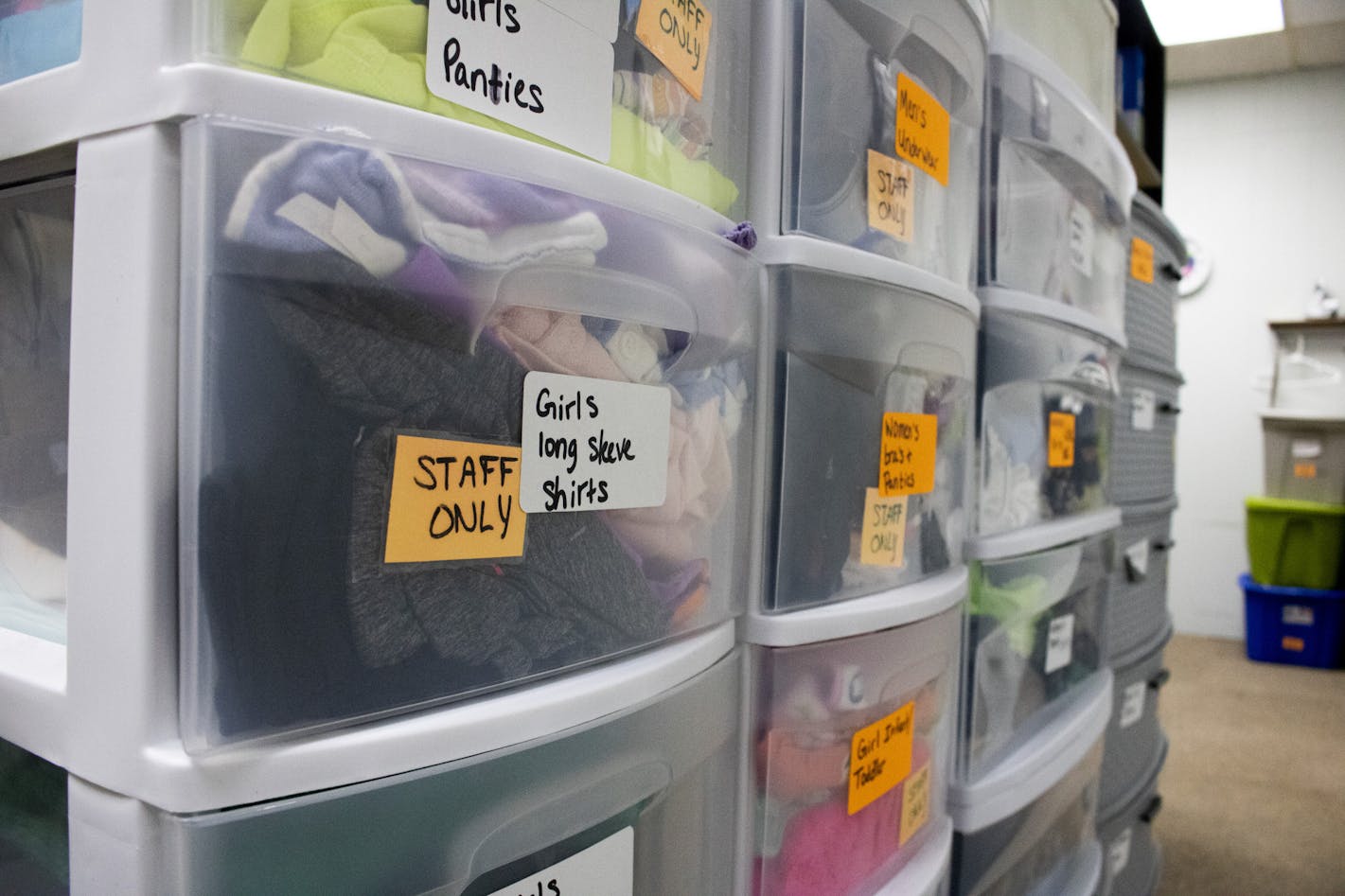
Donated clothes fill bins for clients of the Isabella County Restoration House Wednesday, Dec. 6, in downtown Mount Pleasant. (CM-Life | Jenna Spanola)
Over the past decade, Obrecht said the ICRH has served over 1,000 individuals, including 234 children, and have served roughly 26,000 meals.
Norma Bailey is a founding member of the Unitarian Universalist Fellowship of Central Michigan (UUFCM), which is a partner church of the ICRH.
She said she’s worked with the ICRH since the very beginning, and has been able to witness the organization’s growth from when it first opened almost 11 years ago.
The UUFCM used to serve as one of the check-in locations for those experiencing homelessness.
“Our church served as what was, in a sense, the registering or gathering place,” said Bailey. “So people between 4:30 and 6 p.m. (people) would come to our building and have coffee, tea, some snacks, and then at 6 o’clock, they would be taken to the church.”
Over the years, the UUFCM’s partnership with the ICRH has evolved. As a partner church, Bailey said volunteering is at the core of the UUFCM’s support for the ICRH. Many of the church’s members contribute by preparing beds at the host site, serving meals and engaging in activities with shelter guests.
Obrecht said the ICRH has roughly 32 different churches that it works with. However, not every site is large enough to house 30 guests at a time, so these congregations partner with larger churches or hosts.
NEW YEAR'S RESOLUTION: "I believe that both the church (and I) would maintain our strong support of the Isabella County Restoration House in the same way that we have. Over the years, we continue to be the same support. ... It takes a whole community to make this work."
-- Norma Bailey, UUFCM member
The host sites provide shelter, Obrecht said, while the partnering churches provide the volunteers, services and meals.
Bailey, as well as many of the church’s members, is passionate in the effort to address the homelessness issue in the community. The UUFCM’s mission and values closely align with the ICRH, she said.
“One of our principles is the inherent worth and dignity of every person,” she said. “So, if you believe in that, you want to do outreach to help provide that for every person.
“If you look at justice, equity and compassionate human relations, absolutely. This is what we’re trying to do.”
An increased need
The efforts of the ICRH have made a profound impact in the Isabella County community, yet the journey towards addressing homelessness is ongoing.
This year, Obrecht said the need for shelter has been greater, compared to previous years.
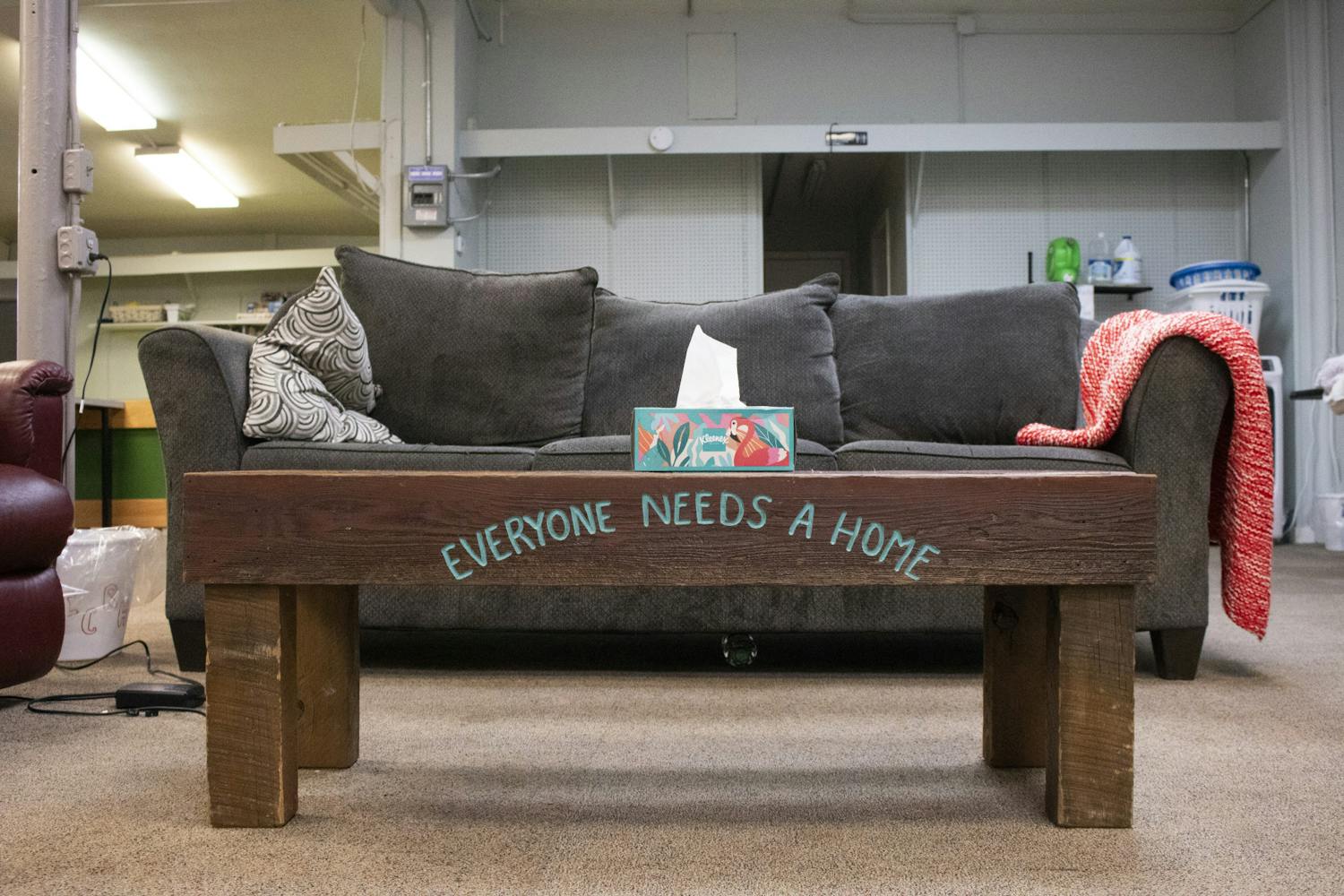
A table inside of the Isabella County Restoration House reflects the home's mission Wednesday, Dec. 6, in downtown Mount Pleasant.
“We filled up very quickly,” she said. “Usually we don’t get to our maximum amount until the end of November and sometimes it’s mid-December, but we got cold quick.
“Our first day we had 21 people at the shelter, and it’s the first time I’ve been here that they were lined up at the door ready to come in.”
To improve their efforts in the community, Obrecht said the organization is on the verge of launching a capital campaign to secure its own facility, enabling them to move away from the rotational model. This shift will allow the ICRH to expand its services by shifting focus and resources towards providing guests with more services.
Additionally, the organization hopes to transition from seasonal to year-round operations within the next few years.
As the organization embarks on this transformative journey, Obrecht said the Isabella County community remains vital in ensuring the ICRH can continue to provide its services. Together, Obrecht and Bailey said they strive to create a narrative of hope, compassion and commitment to making a brighter future for all.



